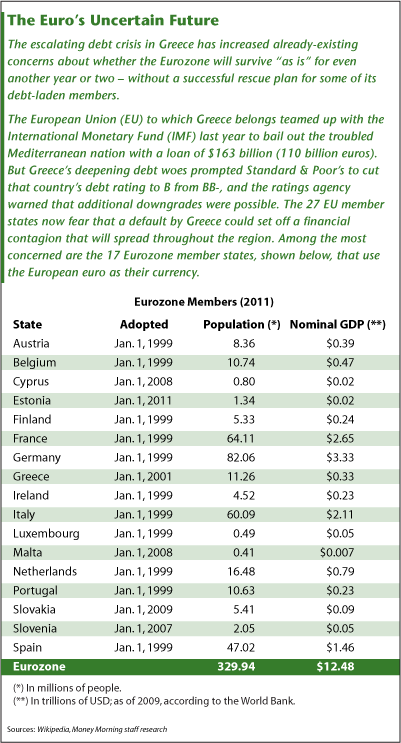The Eurozone project has seen better days, which is why the future of the euro isn't a bright one.
In fact, as all the latest speculation about Greece either abandoning the euro currency - or being booted out of the Eurozone outright - is demonstrating, "the market" is about to apply a level of pressure well beyond what the Eurozone and European Union (EU) were designed to handle.
The number of sovereign states in the EU that are facing difficulty selling new debt, or even a rollover of current debt, is growing.
The Eurozone and the EU are both in trouble. Clearly, the structure that exists today is flawed and will not withstand the rigors and pressures that are headed directly its way.
The ability to kick the can down the road is about to end, and with it some hard decisions will need to be made by the political and wealthy elite.
Let's take a closer look.
Warning Signs About the Future of the Euro

Just a moment ago, I mentioned that "the market" is ready to expose the flaws in the euro mechanism. The truth is that this is already happening. The risk-adjusted interest rates demanded by the market is now significantly higher than what the market would charge a major AAA-rated corporation for money that it borrowed via a bond issue.
As recently as a few months ago, we reached a point where the credit-default-swap (CDS) pricing on Western European states is higher than Eastern European states.
In case you are wondering, this is a first.
Simply put, bond-risk managers want to be paid a higher rate of return to insure Western Europe than Eastern Europe. This is a significant and statistically important point. The Eastern European states are only partially absorbed into the European Union. Of all the participating members, it's this group of Eastern states that could leave the EU the easiest and quickest of the participating members.
This could all help determine the future of the euro. Indeed, if you look at the big picture, the individual European states will need to consider a return to independent sovereign rule in the extreme - or at the very least a return to separate national currencies, thereby ending the Eurozone and euro currency experiments.

The number of governments that have experienced a change since this economic crisis started is growing.
That list includes all of the island nations of Europe - Iceland, Great Britain and even Ireland. (Just yesterday (Tuesday), in fact, Ireland underscored the challenges it faces and stunned observers by disclosing a plan that will have it raiding private pension accounts in order to finance the spending on its job-growth strategy.)
Even in the heart of continental Europe, the number of nations experiencing wrenching change is steadily growing. Belgium has not had a government in almost a year. And Portugal's austerity challenges are so large in scope that not even Socrates could save it - Prime Minister Jose Socrates, that is. He resigned and is being replaced.
In France, President Nicolas Sarkozy, the most visible leader of the French government, is experiencing career-low approval ratings. His party has committed a series of political gaffes, leaving it weakened and distracted in domestic politics. The current Sarkozy government is focused on G20 political events, trying to generate a positive spin on something. President Sarkozy is not expected to survive the next political round of national elections.
The European (Dis)Union - The Dissolution of the EU
In Germany, the heart of industrialized Europe, we're seeing a series of changes in the makeup of the state-level governments. The current national government of German Chancellor Angela Merkel is expected to fall, with a new coalition of parties forming a government to replace her central conservative government.
Going forward - no matter who is in charge - you can expect to see a German government that's more willing than ever to make "tough calls." For instance, as a direct result of the nuclear-power plant disaster in n Japan, Germany will experience an ever-increasing pressure to turn off all 17 of its own nuclear plants - a move that will prove very costly for consumers.
In the months and years to come, you can expect to see Germany start to focus more on what is best for Germany - to the exclusion of what is best for Europe - even though that self-interest will come at the expense of the rest of Europe.
Germany is going to be far less likely to agree to additional bailouts for other European countries. In fact, the era of unlimited access to Germany's hefty balance sheet is just about over.
The implications for the EU's overleveraged "PIIG" nations (Portugal, Ireland, Italy and Greece) - which no doubt believed they would always have access to Germany's deep pockets - have yet to be fully determined. But to modify an old Wall Street adage - "Bulls make money, bears make money, PIIGS get slaughtered" - when Europe must do without Germany's deep pockets, investors can expect casualties.
So while the idea of unity in Europe may have merit, and the future of a unified Europe is still open to discussion, the cold reality is that the EU, as it currently exists, is on life support. And in its current state, the union and the currency won't even make it to the end of 2012 - at least not in my opinion.

One major problem I see is that the European Central Bank (ECB), which handles the monetary policy for the 17 Eurozone member states, is not properly capitalized to handle the demands being made upon it.
The ECB is tasked with providing independent monetary actions in an environment of extremely intense political and economic negotiations between historically sovereign states. Needless to say, the most sensitive topic is how much each of the more-affluent member states will provide in the way of financial support to weaker sister states (a key reason that Germany is going to become so much more protective of its national balance sheet).
The Irish Connection and the Future of the Euro
Since its beginnings last summer, the European debt crisis has been a major cause for concern, with global investors worrying that it might cause a double-dip downturn in world economies and financial markets.
But as I told some of Money Morning's top editors and writers during one of our regularly scheduled "private briefings" several weeks ago, the drawn-out nature of this affair has helped diminish its impact. At that same time, however, I told the editors about a particular set of circumstances that could serve as the catalyst needed to transform the European debt crisis into a full-fledged conflagration - an inferno intense enough to bring about the dissolution of the euro-currency structure.
The catalyst I identified was Ireland.
And Ireland will play a key role in determining the future of the euro.
In the midst of the growing sovereign debt crisis last year, Ireland was forced to seek a bailout because of an economy that shrank 15% from where it was in 2007. Needless to say, debt, too, was a problem: Government borrowings - about 25% of gross domestic product (GDP) at the end of 2007 - are projected to peak at 116% of GDP in 2014.
"I think we can deal with it," new Irish Prime Minister Enda Kenny said during a meeting of the Council on Foreign Relations in New York last week. "The scale of the challenge is enormous but so is the opportunity."
The new government was brought into power to renegotiate the deal that the last government agreed to with the ECB and International Monetary Fund (IMF). This agreement is both technically in effect and technically not fully agreed upon. In other words, it's in kind of a "limbo" status, leaving the Irish government room to demand renegotiations. Prime Minister Kenny is seeking a reduction on the average 5.8% interest rate his country is paying on that aid.
In much the same way that Iceland had banks that were larger than its entire domestic economy, the Irish banks had grown their own balance sheets beyond the size of the nation they represented. As a result of this levering up process, the tab for bailing out the banking sector could swell to $101 billion - or $21,610 for each of Ireland's 4.5 million citizens.
In other words, in a country with a nominal gross domestic product (GDP) of about $230 billion, this banking mess has left "the people" on the hook for debts well beyond anything that they could hope to pay back.
Little wonder that Ireland's new government appears so willing to rob the private pension funds of its citizenry.
In briefing Money Morning's editors, I said that if Ireland's leaders proved themselves willing and able to indebt the country's future generations - to force those generations to cover bad loans made by what had been the country's "private-sector" banking business -I could see the European debt crisis intensifying in a way most observers just weren't seeing.
Those banks are now being nationalized, and the risks absorbed by the balance of the people.
Making matters worse is the reality that renegotiating the bailout package may be easier said than done.
Germany's Merkel is now in a position where she can't afford to appear to be bailing out any of the EU's PIIG-member states. At the same time, it seems that Kenny's new Irish government has staked its future on providing a reduction in the costs of the bailout.
The bottom line: Neither the Germans nor the Irish appear to have an acceptable compromise to present to the home crowds.
On top of all this, looming quickly is the big sovereign-debt rollover for Italy and Spain, which combined owe about $400 billion. It is a sum that "the market" is not likely going to want to provide on terms either government will find acceptable.
This leaves the already-broke ECB, and its new "bad-bank" twin, the European Stabilizing Fund (ESF), along with the IMF, to ride to the rescue. The rescue will not be piecemeal, but will, in fact, be a major package for most of the liquidity-starved states.
The cost will most likely come in the form of giving up individual sovereign rights, while protecting the banking system from itself.
And if this all can't be ironed out, then the future of the euro will be very, very clear. And so will the currency's epitaph.
All you need is the right blend of high-yielding investments - and the right team of financial experts.
And you can get both right here.
This amazing profit opportunity is the latest offer from the global investing gurus with our monthly affiliate, The Money Map Report.
With investors today facing as much market uncertainty as ever, the Money Map team is constantly hunting for the best investments to share with you. Those recommendations, along with our special report on how to double your money, can be yours. Click here to read more.]
News and Related Story Links:
- Money Morning "Inflection Point" Series:
The Inflection Point: Why the U.S. Dollar is Ready to Rebound. - The BBC:
European Union plays for time over Greece. - New York Times Op-Ed:
Why Greece Should Reject the Euro. - The BBC:
Eurozone inflation rate increases to 2.8%. - Wikipedia:
European Union. - Slate.com:
Belgium's World Record. - Wikipedia:
Euro Zone. - BusinessInsider.com:
Irish Bombshell: Government Raids PRIVATE Pensions To Pay For Spending. - Reuters:
Portugal PM resigns as parliament rejects austerity. - Wikipedia:
Nicolas Sarkozy. - France24.com:
Gaffes and (France's) Government Reshuffle. - Wikipedia:
Angela Merkel. - TheGuardian.com (UK):
Hidden state debts may push Portugal bailout to €90 billion ($129.4 billion). - The Wall Street Journal:
German Greens Demand Nuclear Power Exit by 2017. - NuclearPowerDaily.com:
German Nuclear Exit Could be Costly. - European Central Bank:
Official Website. - The Wall Street Journal:
Ireland's Banks Get Failing Grades. - Ireland Jobs Initiative:
Official Press Release. - International Monetary Fund:
Official Website. - Bloomberg/BusinessWeek:
Ireland's Prime Minister Kenny Says Nation Can Handle Debts.


